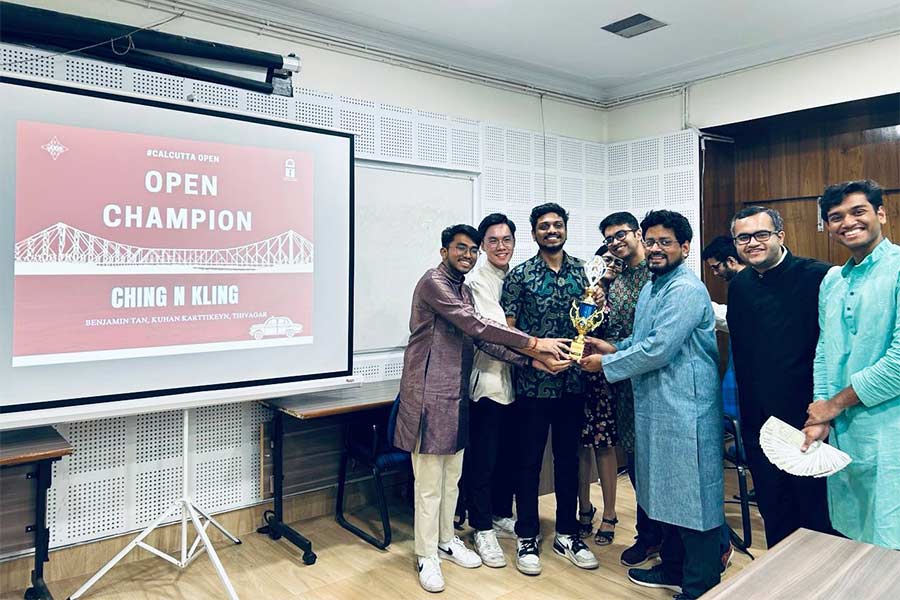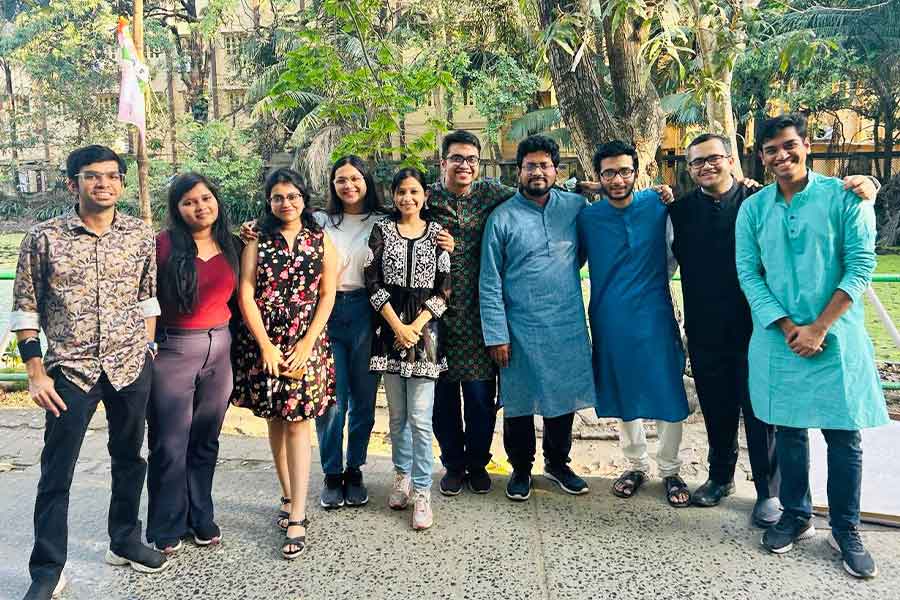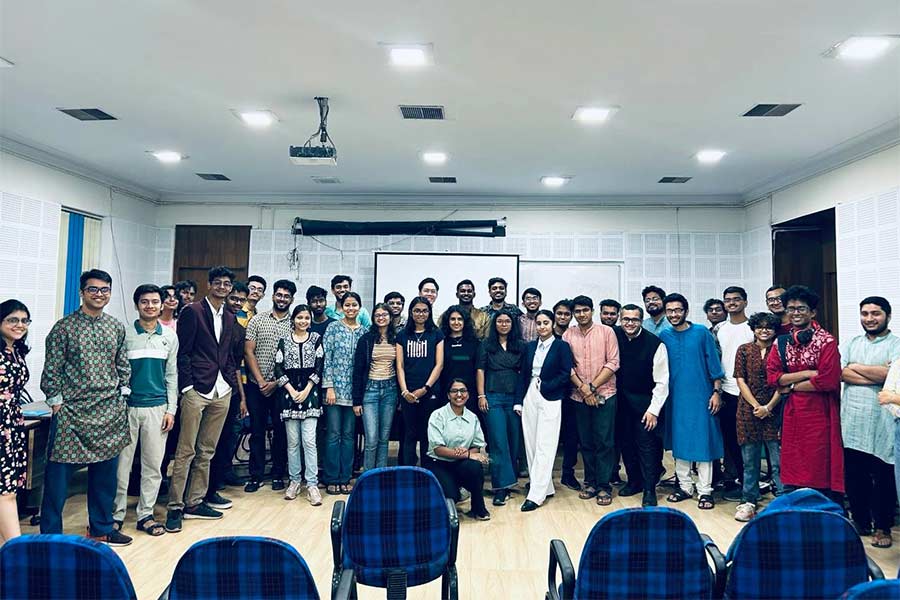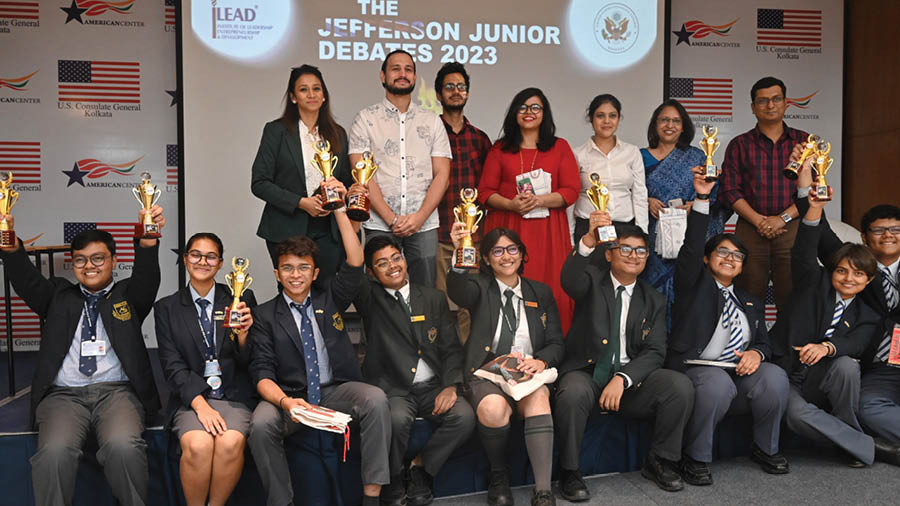The Anita Banerjee Memorial Hall at Jadavpur University was bustling with ideas and arguments between March 9 and 10, as part of Calcutta Open, a parliamentary debate tournament organised by Kolkata Debates, a non-profit organisation consisting of young debaters, and the Jadavpur University Debating Society. For the participants at the tournament, debating is more than a hobby. It is a deep-seated passion to captivate and persuade through a refined combination of critical thinking and eloquence.
‘The tournament was aimed at getting the entirety of the Kolkata parliamentary debating circuit together’
With a total of 30 competing teams, Calcutta Open was held in a hybrid mode, with the first round taking place online (on March 8) and the subsequent rounds hosted by the Jadavpur University campus. Institutions taking part in the event included the West Bengal National University of Judicial Sciences (WBNUJS), Presidency University, Department of Law at Calcutta University, the Heritage Institute of Technology, Kolkata, the Indian Institute of Technology Kharagpur (IIT KGP) and the National Institute of Technology, Rourkela, among others. International involvement was also present, with participants coming in from Bangladesh, Nepal and Malaysia, a rare feat for debate tournaments organised in the city.
“The tournament was aimed at getting the entirety of the Kolkata parliamentary debating circuit together, which is largely unorganised and lacks proper resources and methodical coaching. Calcutta Open began as an entirely virtual tournament at the onset of Covid-19, which was followed by a small in-person competition post-pandemic. But the scale grew considerably this year, as Calcutta Open became international. All this was possible thanks to the numerous people who’ve been a part of our initiative over the years. As an organisation, our vision is to inspire the debating community in Eastern India so that they can aspire to compete at the international level,” said Rahul Datta, senior debater and co-founder of Kolkata Debates. Alongside Rahul, Kolkata Debates is managed by its other co-founder and senior debater, Rajarshi Paul, a final year BTech student at the Heritage Institute of Technology.
Results and individual winners

The University of Malaya team pose with their winner’s trophy
The motions at Calcutta Open included a variety of themes, ranging from art, Artificial Intelligence (AI), environment and health to politics, philosophy, sports and relationships. At the end of four preliminary rounds, eight senior teams and four novice teams qualified for the knockout rounds. The grand final witnessed a riveting contest between the University of Malaya (named Ching N Kling), represented by Benjamin Tan, Kuhan Karttikeyn, and Thivagar, and IIT Kharagpur, represented by Jaya Kedia, Nimisha Gupta, and Sugandh Sinha. The motion for the final was: “Assuming technology exists to verify whether two people are actually in love, This House Regrets a world with arranged marriages.” By a unanimous decision of the adjudicators, the University of Malaya was declared as the 2024 Calcutta Open champion.
“I loved the tournament, the spirit in which it was organised and the hospitality we received in Kolkata. The organising committee was extremely accommodating of all our needs. Not only did they assist us during every round, but also gave us recommendations on where to eat and which places to go to in the city. Another positive about Calcutta Open is that the tournament proceeded on time and was managed efficiently. That allowed us to go back at the end of each day and get proper time to eat and take rest,” said Kuhan Karttikeyn, representing the University of Malaya.
In the novice final, the team from the West Bengal National University of Judicial Sciences, comprising Arjun Singh, Meher Govekar, and Rajat Sharma, came out on top against the National Institute of Technology, Rourkela.
In terms of the individual awards, Rashrvin Pillay Vijaya Kumar claimed the best adjudicator prize, with Swapnil Aichbhaumik coming in at second. The best individual speaker gong went to Kuhan Karttikeyn.
Kolkata Debates aims to expand beyond universities and colleges

Members of the adjudication panel at Calcutta Open
The core adjudication panel at Calcutta Open was formed by three chief adjudicators — Ahmad Tousif Jami and Adel Mostaque Ahmed from Bangladesh and Ishan Mukerji from Kolkata. As a developmental initiative to enhance regional growth, prolific debaters Nilakshi Moitra and the author joined the panel as shadow chief adjudicators. “Kolkata has always provided a fulfilling experience when it comes to debating. I think one of the key elements we had to keep in mind is the quality of debate that we were trying to strive for, given that it’s a developing circuit. But, overall, it was a great experience,” said Adel Mostaque Ahmed.
Prior to the tournament, Kolkata Debates had arranged for virtual training workshops to be conducted for the debaters by renowned names in the international debating circuit. The adjudicator and speaker workshops were conducted by Anum Naseer from Pakistan and Tengku Omar from Indonesia, respectively, while in another virtual workshop, the motions of the debate were debriefed by debating stalwart Harish Natarajan from the UK.
Going forward, Kolkata Debates aims to expand beyond universities and colleges, as they wish to introduce the parliamentary debating format across schools in Kolkata. They believe that parliamentary debating is the catalyst required to help school debaters prepare for and compete in international tournaments such as the World Schools Debating Championship.

